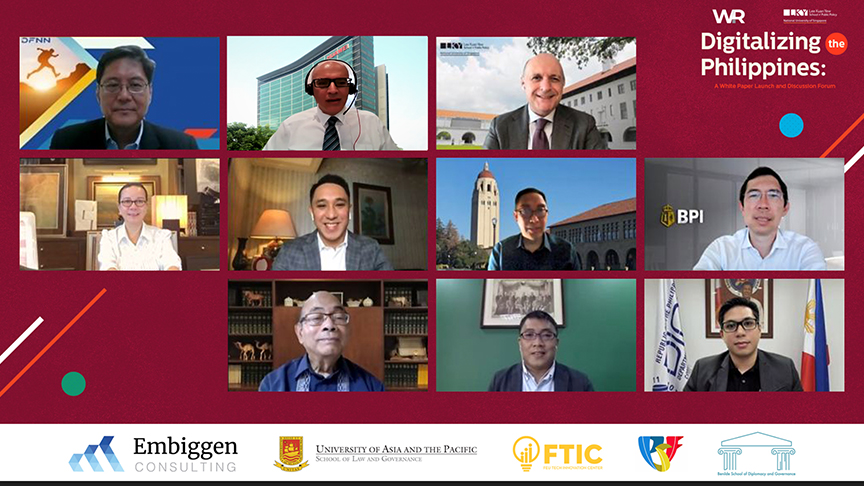The onset of coronavirus, which restricted mobility and economic activity, emphasized the importance of digitalization in a pandemic. It accelerated the adoption and use of digital technologies such as e-commerce, digital payments, online learning, online entertainment, telemedicine and other online services to cope with social distancing measures and ensure business continuity.
Although the use of digital technologies is rising in the Philippines, it is still below its full potential. The country still lags behind the digital adoption of its regional neighbors and the rest of the world.
Factors needed to build an effective digital economy as well as challenges that were encountered in pursuing digitalization in the country were discussed by industry experts in “Digitalizing the Philippines,” a White Paper launch and discussion forum recently held by public affairs and strategy firm W&R and the National University of Singapore’s Lee Kuan Yew School of Public Policy (NUS-LKY School of Public Policy).
“As mobility restrictions and social distancing measures have been limiting our face-to-face interactions, the mobility of digital technology has emerged as key determinants for resilience and for continuous growth,” said NUS vice dean and associate professor Francesco Mancini as he presented LKY School’s latest study entitled “Overview of the Development of the Digital Economy in the Philippines.”
Mancini also said digital technologies have permitted business transactions to continue delivery of goods, online communication allows the work-from-home setup, and allows meetings to people everywhere in the world.
To promote the digital economy, Mancini recommended investing in both infrastructure and people. This entails government policies and projects that can complement commercial initiatives to secure access to technology and training for all Filipinos.
Efforts to pursue digitalization in the Philippines are hampered by challenges which exposed the vulnerability of marginalized sectors that had little or no access to public services and economic opportunities. One of the most important of these services is access to the Internet.
“The pandemic has vividly demonstrated how fast, reliable and affordable connectivity makes a huge difference when engaging in e-commerce, online learning, online entertainment, telemedicine, and the simple but vital act of staying in touch with your loved ones,” said Senator Grace Poe-Llamanzares, in her keynote address.
Affordability is another issue, according to Poe-Llamanzares. “At $6.37 per month for 500mb of prepaid headset-based mobile broadband, the Philippines has the fourth highest cost in the region, next to Singapore which offers better internet services, Brunei and Malaysia.
The digital divide – a gap that exists between those who have access to the Internet and devices, and those that are closely underserved or unserved – is another challenge. It is estimated that 40% of Filipinos are not yet connected, and this lack of connectivity exacerbated poverty in the country which is equivalent to around 20-million Filipinos who find themselves in.
Poe-Llamanzares notes that there is a positive correlation between internet accessibility and the country’s social economic development. Studies show that increasing broadband penetration by just 10% has resulted in a 1.35% to 1.38% increase in GDP of developing countries, and point to issues that must be addressed such as lack of infrastructure, lack of service providers hence limited choices for consumers, lack of performance standards for service providers, and a transparent and well-managed allocation system.
To effectively digitalize the Philippines, a committee chaired by Poe-Llamanzares enacted a bill called The Better Internet Act which mandates (a) the increase in service coverage, (b) sets the threshold speed and other service standards that they will provide at a certain average every single day. It should also streamline permits and be able to update penalties in violation of franchise agreements, especially telecom companies in the Philippines.
Another avenue that can be taken towards Internet services is to allow for greater participation of foreign investment in the telecom industry. An increase in the number of players and capital infusion would enhance competition that spurs better consumer services. Telecom companies are classified as public utilities and under our laws, foreign ownership in public utilities is restricted to a maximum of 40%.
Poe-Llamanzares posted a bill which amends the Public Utilities Act where the term “public utilities” shall no longer be categorized as utilities but rather as public services that is not a natural monopoly, thereby moving from legal restrictions on foreign direct investment. This is already in the period of amendment in the Senate.
On the part of the DICT, it released the common tower policy to actually help improve the tower buildup because a telco can use one tower compared with then putting their own tower. It is monitoring the number of towers and permits needed so tower and fiber rollout as well as building solution will be fast tracked. There’s also the entry of satellite technology.
“The government has been doing a lot of initiatives to actually increase the connectivity, increase the speed of Internet, and increase the reach of Internet across the country,” said Atty. Randy Echaus, DICT’s assistant secretary.
Private enterprises have also been taking initiatives to bridge current digital gaps. Aside from working on advancements like AI, IoT, and Cloud computing, tech innovation company Huawei is looking to collaborate with more small and medium enterprises (SMEs) to drive new technologies and digital literacy.
“Businesses are where the greatest opportunities are. The Philippines is really currently driven by SMEs, and they’re also the major employer,” said Huawei vice president and economic advisor of government affairs Andrew Williamson.
Huawei aims to build a sustainable startup ecosystem for the Asia Pacific region over the next three years through its Spark Program. It is currently helping incubate and upscale SMEs in countries like the Philippines.
For Bernardo Villegas, founder and professor at the University of Asia and the Pacific, it is very important to digitalize the country’s service sector where 70% or more of the GDP come from.
“This improves significantly productivity in the service sector whether it is e-learning, e-commerce, e-banking, e-entertainment, e-medicine and not to mention the supply chain which includes benefits from agriculture and manufacturing, and not to mention the 10-million overseas workers. They belong to the service sector and are actually beneficiaries of digitalization








































































































